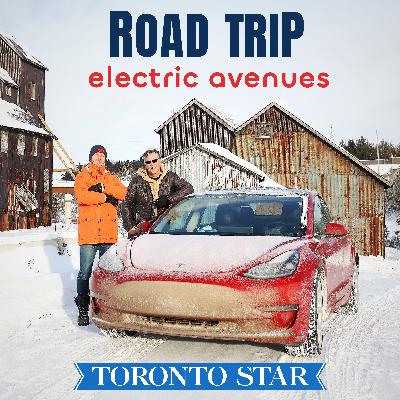Discover Road Trip | Electric Avenues
Road Trip | Electric Avenues

Road Trip | Electric Avenues
Author: Toronto Star
Subscribed: 10Played: 53Subscribe
Share
© Toronto Star
Description
From mine to battery to electric vehicle – Ontario’s clean economic future is being built around electric vehicles (EVs). The Star's climate change reporter Marco Chown Oved and photographer (and EV owner) Steve Russell embarked upon a week-long road trip – in an EV, of course – to visit sites around the province that will figure in this cleantech future.
8 Episodes
Reverse
From mine to battery to electric vehicle – Ontario’s clean economic future is being built around electric vehicles (EVs). The Star's climate change reporter Marco Chown and photographer (and EV owner) Steve Russell embarked upon a week-long road trip – in an EV, of course – to visit sites around the province that will figure in this cleantech future.
In a cross-over episode of Toronto Star podcasts, This Matters' Ed Keenan interviews Road Trip: Electric Avenues' Marco Chown Oved, the Star's climate change reporter. They have a wide-ranging conversation about the week-long road trip, from how their electric vehicle performed in the dead of winter, to the future of Ontario's EV supply chain opportunities.
Toronto Star photographer Steve Russell and climate change reporter Marco Chown Oved went on a road trip through northern Ontario in the dead of winter. It was cold, blizzarding and icy. They travelled 2,300 km during the coldest week of the year. And they did it in an electric vehicle (EV). Sudbury, Ont., has some of the richest nickel deposits in the world and is already supplying some battery makers. In the future, Canadian nickel could replace the critical minerals needed for the huge batteries that power EVs, which currently come from some pretty awful places. Join us for Episode 1 and a trip 2.5 km underground in one of Canada’s oldest mines.
In this episode, we visit a cobalt refinery in Cobalt, Ont. that’s running on renewable power and doubling as a battery recycling plant. Electra Battery Materials bought the plant in 2018 and five years on, they’ve got the first cobalt refinery in North America, the only alternative for EV manufacturers who currently get their cobalt refined in China. Toronto Star photographer Steve Russell and climate change reporter Marco Chown Oved went on a road trip through northern Ontario in the dead of winter. It was cold, blizzarding and icy. They travelled 2,300 km during the coldest week of the year. And they did it in an electric vehicle (EV).
Ontario is virtually unique in the world. Thanks to plentiful natural resources, clean energy and a large automotive sector, it has every stage in the EV supply chain right here at home. In theory, the province could mine the metals, make the batteries, produce the steel and assemble the electric car entirely in the province. But to plot a way to a more prosperous and environmentally responsible future, we need to look at our past. That’s why we headed to Cobalt, one of Ontario’s biggest mining boom towns, where great wealth was hauled out of the ground for more than a century, and now, very little remains. We met up with Charlie Angus, the local MP, former punk rocker, journalist and amateur historian.
Steel is one of the biggest emitters of carbon in the world. Currently, steelmaking is responsible for seven to nine percent of total global emissions. That’s about 2.6 billion tonnes of carbon — or four times more than all the emissions produced in Canada. And because most steel is made by melting down iron using coal, it’s very hard to decarbonize. In Sault Ste. Marie, Algoma Steel is transitioning its 100 year old coke oven and blast furnaces to electric arc furnace technology. It’s a change that will cut its carbon emissions by 70 per cent. Since Ontario’s electricity grid is so clean, Algoma Steel will become some of the cleanest steel on the planet. It’s already being used in EVs and will soon make its way into electrical towers and infrastructure used to build the clean economy.
While China dominates the EV supply chain today, the ranking — put out by Bloomberg — really looks at the future and singles out Canada for having better environmental and labour standards, as well as a robust automotive sector and vast mineral deposits. But battery manufacturing itself is still in its infancy. There are plans to build three battery plants in Canada — Volkswagen in St. Thomas, Northvolt in Saint-Basile-le-Grand and NextStar in Windsor. NextStar was the first battery plant announced and is the furthest along, and while it’s not up and running yet, they agreed to show us around.
When we started this podcast, we really wanted to visit each step of the EV production process to show a complete picture of the supply chain, but in the end, we couldn’t seal the deal. First off, the cam and cathode production isn’t coming to Ontario. Right now, it’s all being built in Bécancour, Quebec. And while there are plans to retool auto assembly plants to make EVs, there’s currently only one that’s operational — the GM electric delivery van plant in Ingersoll — and when we asked to visit, we found out it had been shut down due to supply chain snags. So instead, our final stop is North Bay where they are making specialty EVs for the mining industry. Toronto Star photographer Steve Russell and climate change reporter Marco Chown Oved went on a road trip through northern Ontario in the dead of winter. It was cold, blizzarding and icy. They travelled 2,300 km during the coldest week of the year. And they did it in an electric vehicle (EV).





